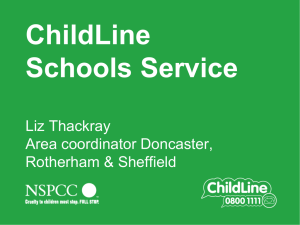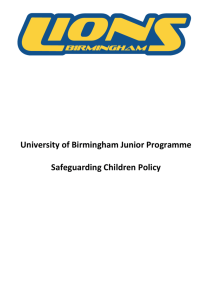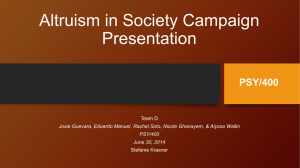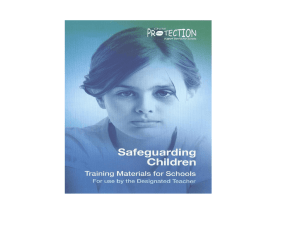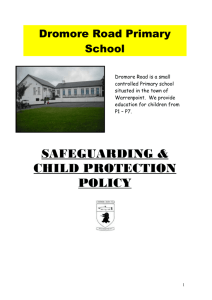Child Protection
advertisement
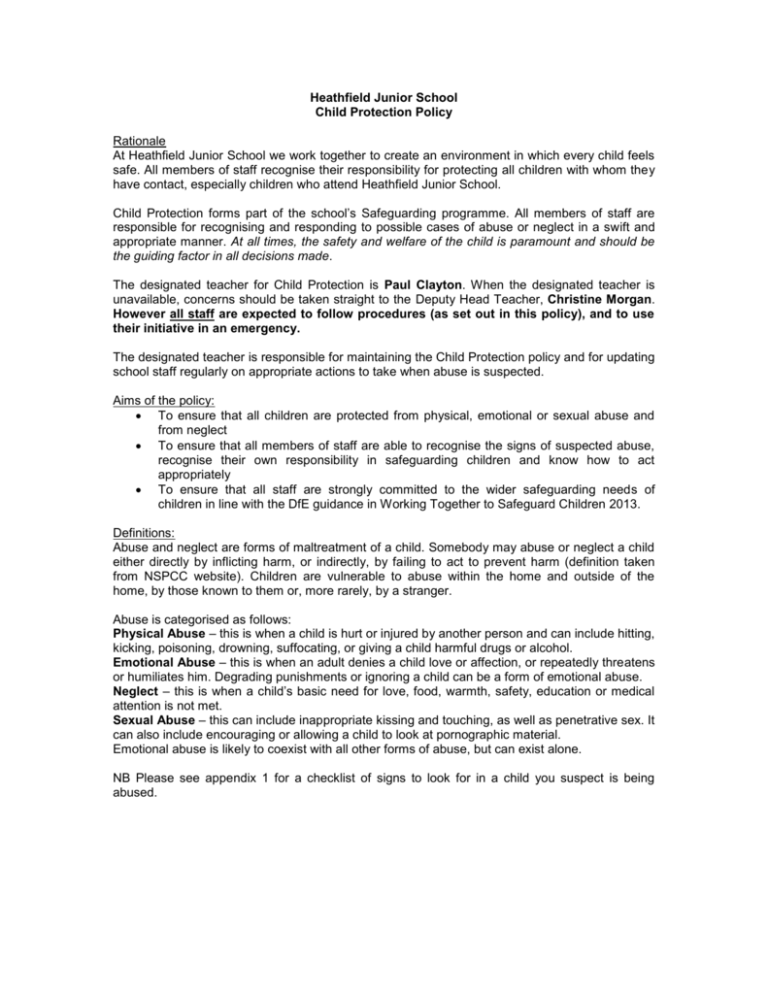
Heathfield Junior School Child Protection Policy Rationale At Heathfield Junior School we work together to create an environment in which every child feels safe. All members of staff recognise their responsibility for protecting all children with whom they have contact, especially children who attend Heathfield Junior School. Child Protection forms part of the school’s Safeguarding programme. All members of staff are responsible for recognising and responding to possible cases of abuse or neglect in a swift and appropriate manner. At all times, the safety and welfare of the child is paramount and should be the guiding factor in all decisions made. The designated teacher for Child Protection is Paul Clayton. When the designated teacher is unavailable, concerns should be taken straight to the Deputy Head Teacher, Christine Morgan. However all staff are expected to follow procedures (as set out in this policy), and to use their initiative in an emergency. The designated teacher is responsible for maintaining the Child Protection policy and for updating school staff regularly on appropriate actions to take when abuse is suspected. Aims of the policy: To ensure that all children are protected from physical, emotional or sexual abuse and from neglect To ensure that all members of staff are able to recognise the signs of suspected abuse, recognise their own responsibility in safeguarding children and know how to act appropriately To ensure that all staff are strongly committed to the wider safeguarding needs of children in line with the DfE guidance in Working Together to Safeguard Children 2013. Definitions: Abuse and neglect are forms of maltreatment of a child. Somebody may abuse or neglect a child either directly by inflicting harm, or indirectly, by failing to act to prevent harm (definition taken from NSPCC website). Children are vulnerable to abuse within the home and outside of the home, by those known to them or, more rarely, by a stranger. Abuse is categorised as follows: Physical Abuse – this is when a child is hurt or injured by another person and can include hitting, kicking, poisoning, drowning, suffocating, or giving a child harmful drugs or alcohol. Emotional Abuse – this is when an adult denies a child love or affection, or repeatedly threatens or humiliates him. Degrading punishments or ignoring a child can be a form of emotional abuse. Neglect – this is when a child’s basic need for love, food, warmth, safety, education or medical attention is not met. Sexual Abuse – this can include inappropriate kissing and touching, as well as penetrative sex. It can also include encouraging or allowing a child to look at pornographic material. Emotional abuse is likely to coexist with all other forms of abuse, but can exist alone. NB Please see appendix 1 for a checklist of signs to look for in a child you suspect is being abused. Procedure for dealing with abuse, or suspected abuse at Heathfield Junior School If you have any reason to be concerned that a child may be being abused, you have a responsibility to act. If you suspect that a child is being abused, or if a child discloses to you that he is being abused, you should: Listen carefully to the child without judging. Try not to ask leading questions or prompt the child, but give him time to explain what has happened. Not give false promises of confidentiality: explain to the child that you have a duty to help him and that this will mean telling someone else about what he has said. Reassure the child that he has done the right thing by telling you and that he is not to blame. Inform the designated person as soon as possible. Best practice is to pass the information on verbally, so that you know that the message has been heard and then follow up in writing. Record what the child said as soon as possible: stick to the facts, date and sign your record and pass it urgently to the designated person. (In the majority of cases, the designated person will inform Social Services and take advice. If at all possible, this is to be done by telephone by 3 p.m. on a school day. The person making the phone call to Social Services is responsible for following the phone call up in writing with a fax or email.) Continue to monitor the child after you have reported the suspected abuse. Maintain confidentiality – speak about the incident only with people who need to know (usually designated teacher, Social Worker). Remember: it is better to pass on information, however small it seems, as it may be a small part of a bigger picture of abuse. Allegations against staff The school follows the “Richmond Guidelines on practice and procedures regarding education staff and child protection” for any allegations of abuse made against staff. Records A record of all conversations and meetings must be kept. A hard copy of all notes must be kept securely in the child’s blue Child Protection folder, which is kept in the locked cupboard in the Head Teacher’s office. Viv Blunden informs the designated person of any children leaving the school so that appropriate records can be passed on. Support for Children who have been abused All members of staff may be called upon to offer support to children who have been abused. At Heathfield Junior School we also have two trained therapists who are available to the children one day each per week. Through the PSHE curriculum, regular Safeguarding Weeks and through assemblies, children are reminded of what to do if they are being hurt or abused and who they can talk to (including family members, school staff, designated teacher for Child Protection, therapist, NSPCC, Child-line). The school works closely with the NSPCC to ensure that all children are aware of how to stay safe and who to talk to (including Childline) if they are unhappy. For further information: Please speak to the designated teacher for Child Protection or look at one of the following websites: www.nspcc.org.uk or www.childline.org.uk If you are concerned about a child and are unable to work within normal school procedures (e.g. during school holidays) you have a responsibility to contact the Initial Response Team yourself: 020 8891 7969 or 020 8744 2442 (out of hours). You can also call the NSPCC (0808 800 5000) who will be able to advise. Updated by Helen Child (May 2014)

